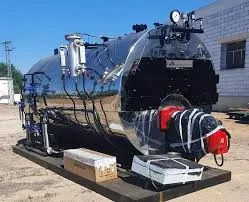
Dec . 05, 2024 17:24 Back to list
Understanding the Fundamentals of Steam Boiler Operation and Maintenance Techniques
Understanding Steam Boiler Operation
Steam boilers are essential components in various industrial processes, generating steam that can be used for heating, powering machinery, or producing electricity. The effective operation of steam boilers is crucial for ensuring safety, efficiency, and reliability in operations. This article delves into the fundamental principles of steam boiler operation, focusing on design, types, key components, and operational procedures.
Types of Steam Boilers
Steam boilers are generally categorized into two main types fire-tube boilers and water-tube boilers.
1. Fire-Tube Boilers In fire-tube boilers, hot gases produced from combustion pass through tubes surrounded by water. The heat from these gases transfers to the water, generating steam. Fire-tube boilers are typically compact and are used in small to medium-sized applications.
2. Water-Tube Boilers Unlike fire-tube boilers, water-tube boilers have water circulating inside tubes that are heated by external combustion gases. This design allows for higher pressures and efficiencies, making water-tube boilers suitable for large-scale industrial applications.
Key Components of a Steam Boiler
Steam boilers consist of various critical components, each playing an essential role in their operation
- Boiler Shell The outer structure that contains the water and steam. It is usually made of thick steel to withstand high pressure.
- Burner The burner mixes fuel (oil, gas, or coal) with air for combustion, creating the heat required to generate steam.
- Heat Exchanger This component transfers heat from the combustion gases to the water, facilitating efficient steam production.
- Steam Drum In water-tube boilers, the steam drum collects the steam produced from the water heated in the tubes.
steam boiler operation

- Safety Valves Safety valves automatically release steam to prevent excessive pressure buildup that could lead to boiler failure
.- Control Systems These systems automatically monitor and adjust boiler operations, maintaining optimal conditions for steam generation.
Operating Procedures
The operation of a steam boiler requires careful attention to various parameters to ensure safety and efficiency
1. Starting the Boiler Before starting a steam boiler, operators must conduct pre-start checks, including inspecting water levels, checking fuel supply, and ensuring all controls and safety devices are functional. Failing to perform these checks can lead to operational failures or explosions.
2. Ignition Upon confirming that the boiler is safe to operate, the burner is ignited, and combustion begins. The operator must monitor the flame to ensure it is stable and efficient.
3. Water Management The water level within the boiler must be maintained within a specific range. This is critical for safety, as low water levels can lead to overheating and damage, while high levels can cause water carryover in the steam.
4. Pressure and Temperature Monitoring Continuous monitoring of pressure and temperature is vital. Operators must adjust the fuel input and water supply accordingly to maintain desired steam pressure and temperature.
5. Regular Maintenance Routine maintenance is key to the longevity and efficiency of steam boilers. This includes cleaning the boiler, checking for leaks, inspecting safety devices, and performing non-destructive testing on pressure boundaries.
6. Shutdown Procedures When shutting down a boiler, operators must follow established procedures to safely cool the system, allowing pressure and temperatures to drop to manageable levels before performing any maintenance work.
Conclusion
Steam boilers form the backbone of many industrial operations, providing reliable and efficient steam for various applications. Understanding the intricacies of steam boiler operation—ranging from the types and components to the operating procedures—are essential for operators and maintenance personnel. By adhering to safety protocols and conducting regular maintenance, the risks associated with boiler operation can be minimized, ensuring both efficiency and safety in industrial processes. As industries evolve, the need for skilled boiler operators and technicians will continue to grow, emphasizing the importance of knowledge and vigilance in steam boiler operation.
-
Efficient Biomass Fired Hot Water Boiler | AI Heating Solution
NewsAug.01,2025
-
High-Efficiency Gas Thermal Oil Boilers | HPT Models
NewsJul.31,2025
-
Oil Fired Hot Water Boilers Sale - High Efficiency & Affordable
NewsJul.31,2025
-
High-Efficiency Commercial Oil Fired Steam Boiler for Industry
NewsJul.30,2025
-
High-Efficiency Biomass Fired Thermal Oil Boiler Solutions
NewsJul.30,2025
-
High Efficiency Gas Fired Thermal Oil Boiler for Industrial Heating
NewsJul.29,2025
Related PRODUCTS






















